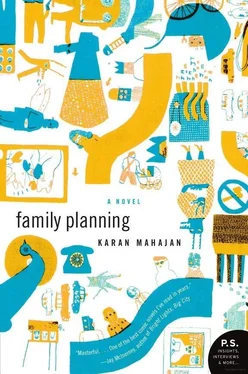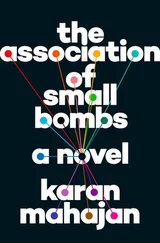Thanks to the food, Mr. Ahuja felt a little ill himself; he regretted sending the peremptory message to the SPM — his boss! — the one person who’d done so much for his political career. Still, what was done was done. He was here to talk to Arjun. He splashed his spoon into the yogurt bowl and decided to follow the boy to the nursery through the cramped house.
Arjun was standing before Mrs. Ahuja with one arm furiously rocking Gita’s crib.
Mrs. Ahuja, of course, was knitting.
“Mama,” said Arjun. “I can’t help you with the feeding today. I have to go practice with my band.”
Arjun knew Mr. Ahuja was listening, and so he delivered the statement as forcefully and dramatically as he could.
“Pass me the wool,” she said. “This sweater is to be made with two colors.”
Arjun had a vivid flash of his childhood: a prison with bars made of wool, huge knitted cobwebs blooming around the house. At night, the two rooms — each of which held five children — looked like a sighing coral reef, veins of yarn wrapped around each child. Their mother perpetually in the thrall of morning sickness, moving from pregnancy to pregnancy with such haste that there was almost no spot in the house where she hadn’t given birth. Luckily, Arjun only had to share a room with ten-year-old Rishi and twelve-year-old Varun.
“Mama! I cannot stay home today to feed the children,” Arjun shouted.
“Are you listening to your son?” Mrs. Ahuja said. “No sense of family he is having. One day in the week he is to help and even that he cannot do.”
Mr. Ahuja turned to Mrs. Ahuja. “Sangita! He is upset because you are making him wear short pants. Look how he is growing! Maybe you should knit for your elder children, have you ever considered this? He doesn’t have a pocket on his shirt. And he is wearing short pants. The other boys must be mocking him at school. Correct?”
“What?” they both asked.
“Are you not in short pants?” Mr. Ahuja asked.
“Papa, I am in a rock band. A rock band .”
“See, what animalistic way he is talking in already,” Mrs. Ahuja said, casting off a stitch. “Soon he will have long hair and be chanting in Rishikesh with some babus.”
How did Mama know about the Beatles? This blew Arjun’s mind.
Mr. Ahuja was less impressed. “Arre! The boy is wanting to do something, so let him?”
“Pass me the wool, Arjun,” she said.
Arjun was upset and did as he was told. But the way he handed his mother the ball of yarn — letting it drop into her lap, unspooling in the air — was his way of saying: Why can’t you argue more with me? Why can’t you beg me to stay? Why can’t you say to him — I can’t bring up so many children alone, I need Arjun? After all, in the past, he had been on duty daily . He had been the head constable who kept the peace. He loomed over the children while Sangita fell asleep under the smooth spell of the massage-wali; learned to hip-hold a child the right way before he learned to grip a cricket bat; never wore a shirt that wasn’t acid-washed by yellow drool; always agreed to sprawl out on the carpet and roll dinky cars along a distracted baby’s line of vision; taught each of the children to suck their respective thumbs (he’d demonstrate for hours on end, glug-glug-glug, claiming thumbs tasted like chocolate) in order to allow for a little silence in the house; instilled a fear of ghosts to keep them glued to their beds at night; covered up for Sangita when she set fire to one of the (baby-free) cribs with a candle she was carrying to her makeshift shrine; and even made polite conversation with her about her favorite TV shows.
Then, inexplicably, a year ago, he’d been relieved of his post, forced into retirement, replaced by Varun and Rita, and now he missed being in charge. If his Mama wanted him on duty only once a week, she couldn’t have him at all.
Arjun stormed out of the house, the screen door crackling behind him. His parents didn’t even care that he had a secret life. They could never be shocked out of their complacency. He could have become the most famous rock star in the world, he could have had three #1 hits, a Grammy-nominated album that the critics called the “enraged embodiment of Indian teenage life at the outset of the millennium”—he might even have flared through the countryside on a grand tour (at this moment, he paused and imagined himself on a stage with a mountain of amplifiers stacked sky-high behind him, the stage a shiny gray soon to be dulled by a rainstorm of pink panties, the microphone shivering with all the delicacy of a phallus caught in fellatio and the giant sea of heads floating beneath him like hairy algae, among them only one face visible, one beaming almond-shaped face) — Aarti’s face. He was the most famous rock star in the world and Aarti knew it. He imagined Aarti standing in the front row at a concert, both of them staring sweetly at each other.
Keeping the vision before him at all times (he saw her like the afterimage of a light bulb, in purple), he took an auto to Ravi’s place and clutched the guardrail tight. Minutes after he arrived, Anurag and Deepak breezed into the driveway in a Santro, guitars strapped on their backs at diametrically opposite angles so as to produce the effect of bad-ass symmetry. They walked into Ravi’s tiny room for a conference.
“You won’t believe what happened today, yaar,” said Ravi.
“What, yaar?”
He narrated an unlikely story involving an ice cream seller, a traffic light, and a hot babe.
“Then?”
“She totally winked at me.”
“Cool. Can we start with ‘Summer of ’69’?” Arjun asked.
“Bryan Adams?” said Deepak. “You’re being a metrosexual now?”
“We are only playing Metallica style tunes here,” echoed Anurag.
“But I am the lead singer!” said Arjun. “I provide the emotion. I cannot provide emotion from a song by people who eat — who eat rust for fun.”
“Oh, that’s a good line for a song. Or title. Eat Rust for Fun ,” said Ravi, defending Arjun.
“Exactly!” said Anurag. “For a Metallica song!”
They settled on Bon Jovi as an acceptable compromise.
At first that day, the tunes of the band were only fleeting bouts of melody, wisps of song that arose from the (clearly random) intersection of instruments. The beat seemed to throb beneath the guitars, but then when the guitars went awry the beat was all you heard, the song became nothing but Arjun screaming past the pounding of percussion and you had to start all over again and you’d stop singing and the guitars would stop going, and only the stupid drummer, stupid self-hating Ravi, would keep thrashing away. It was as if he had decided already, obviously, that he was the center of the band or, if not the center, then at least the backbone and you know, time and tide and Ravi’s drums waited for none, so you’d just have to kind of sit there till the boy had had his share of showing off. It was his house. They couldn’t say anything.
Instead, they sweated the same sweat and ran afoul of each other; blamed each other for not using enough Ax Spray; at one point Ravi walked in from the bathroom and misted his bedroom with deodorant, leaving a damp residue on the walls which dilated and contracted with the same ominous intensity as monsoon seepage. As for the boys, their eyes stung as they leaned into the PC and tried to swipe tabs and chords off the Internet. What was band-width but the breadth of experience a band could copy-paste off the Internet? What was evolution but homing in on the easiest songs? Clapton was out; so were The Eagles; so was Metallica. Bands like Staind and Oasis and Bryan Adams and Steppenwolf were stripped down to a mere progression of power chords, their song-length magic fissioned into tiny fragments that Deepak bombarded over and over with his Stratocaster, his feet clocking out a number of effects from the amp. In particular, he focused on the whoosh of the UNDER-WATER pedal.
Читать дальше












